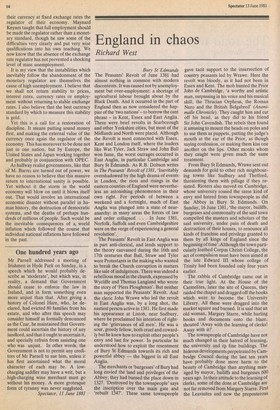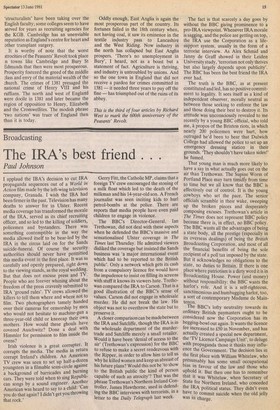England in chaos
Richard West
Bury St'Edmunds The Peasants' Revolt of June 1381 had almost nothing in common with modern discontents. It was caused not by unemployment but over-employment: a shortage of agricultural labour brought about by the Black Death. And it occurred in the part of England then as now considered the happier of the 'two nations' – to borrow the cant phrase – in Kent, Essex and East Anglia. There were brief revolts in Scarborough and other Yorkshire cities, but most of the Midlands and North were placid. Although the Revolt is most connected with Essex, Kent and London itself, where the leaders like Wat, Tyler, Jack Straw and John Ball won fame, the worst outrages occurred in East Anglia, in particular Cambridge and Bury St Edmunds. As R.B. Dobson writes in The Peasants' Revolt of 1381, 'Inevitably overshadowed by the high drama of events. in London, the riots and risings in the eastern counties of England were nevertheless an astonishing phenomenon in their own right. For periods of between a weekend and a fortnight, much of East Anglia was plunged into a state of nearanarchy: in many' areas the forces of law and order collapsed . . . In June 1381, Norfolk, Suffolk and even Cambridgeshire were on the verge of experiencing a general revolution'._ The Peasants" Revolt in East Anglia was in part anti-clerical, and lends support to the theory canvassed during the 16th and 17th centuries that Ball, Straw and Tyler were Protestants in the making who wanted to break the Church corruption in matters like sale of indulgences. There was indeed a rebellious mood in the church, expressed by Wycliffe and Thomas Langland who wrote the story of 'Piers Ploughman'. But neither man supported the Peasants' Revolt. And the cleric John Wrawe who led the revolt in East Anglia was, by a long shot, the nastiest person active in 1381. He first made his appearance at Liston, near Sudbury, where he proclaimed his intention of righting the 'grievances of all men'. He was a sour, greedy fellow, both cruel and cowardly but he knew how to exploit other people's envy and lust for power. In particular he understood how to exploit the resentment of Bury St Edmunds towards its rich and powerful abbey — the biggest in all East Anglia.
The merchants or 'burgesses' of Bury had long envied the land and privileges of the Abbey; they had burned the place down in 1327. 'Destroyed by the townspeople' says the inscription over the main gate and 'rebuilt 1347'. These same townspeople gave tacit support to the insurrection of country peasants led by Wrawe. Here the revolt was bloody, as it had not been in Essex and Kent. The mob hunted the Prior John de Cambridge, 'a worthy and artistic man, surpassing in his voice and his musical skill, the Thracian Orpheus, the Roman Nero and the British Belgabred' (Anonimane Chronicle). They caught him and cut off his head, as they did to his friend Sir John Cavendish. The rebels then found it amusing to mount the heads on poles and to use them as puppets, putting the judge's mouth at the ear of the Prior, as though saying confession, or making them kiss one another on the lips. Other monks whom they caught were given much the same treatment.
From Bury St Edmunds, Wrawe sent out demands for gold to other rich neighbouring towns like Sudbury and Thetford, threatening them with pillage if they resisted. Rioters also moved on Cambridge, whose university roused the same kind of envy and hatred from townspeople as did the Abbey in Bury St Edmunds. On Sunday, 16 June 1381, 'the mayor, bailiffs, burgesses and commonalty of the said town compelled the masters and scholars of the said university, under pain of death and destruction of their houses, to renounce all kinds of franchise and privilege granted to them by all kings of England since the beginning of time'.Although the town particularly loathed Corpus Christi College, the act of compulsion must have been aimed at the late Edward III whose college of Trinity had been founded only four years earlier.
The rabble of Cambridge came out in their true light. At the House of the Carmelites, later the site of Queens, they raided the chapel and dragged off the books which were to become the University Library. All these were dragged into the market square and burned. It is said that an old woman, Margery Starre, while hurling books and documents onto the blaze, shouted 'Away with the learning of clerks! Away with it !' .
The townspeople of Cambridge have not much changed in their hatred of learning, the university and its fine buildings. The hideous developments perpetrated by Cambridge Council during the last ten years have probably done more harm to the beauty of Cambridge than anything managed by mayor, bailiffs and burgesses 600 years ago. In their attitude to the learning of clerks, some of the dons at Cambridge are not far removed from Margery Starre. First the Leavisites and now the preposterous 'structuralists' have been taking over the English faculty; some colleges seem to have served for years as recruiting agencies for the KGB, Cambridge has an unenviable reputation as England's centre for heart and other transplant surgery.
It is worthy of note that the worst nrocities of the Peasants' Revolt took place n towns like Cambridge and Bury St Edmunds that then were most prosperous. Prosperity fostered the greed of the middle :lass and envy of the material wealth of the church. The crimes of 1381 presaged the national crime of Henry VIII and his ruffians. The north and west of England were docile in 1381 and later became the region of opposition to Henry, Elizabeth and the Cromwellites. The modish phrase 'two nations' was truer of England then than it is today. Oddly enough, East Anglia is again the most prosperous part of the country. Its fortunes failed in the 18th century when, not having coal, it saw its eminence in the textile industry pass to Lancashire and the West Riding. Now industry in the north has collapsed but East Anglia prospers. 'There's no unemployment in Bury', I heard, not as a boast but a statement of fact. Agriculture is thriving, and industry is untroubled by unions. And so the one town in England that did not receive a pardon for crimes committed in 1381 — it needed three years to pay off the fine — has triumphed out of the ruins of its abbey.
This is the third of four articles by Richard West to mark the 600th anniversary of the Peasants' Revolt.







































 Previous page
Previous page